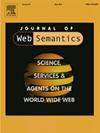弥合OWL和关系数据库之间的差距
IF 3.1
3区 计算机科学
Q3 COMPUTER SCIENCE, ARTIFICIAL INTELLIGENCE
引用次数: 291
摘要
OWL中的模式语句的解释与关系数据库中的类似语句完全不同。如果要将这些语句解释为完整性约束(ic),那么OWL的解释可能看起来令人困惑和/或不恰当。因此,我们提出了一种带有ic的OWL扩展,它可以捕捉关系数据库中ic背后的直觉。我们讨论了检查不同类型知识库的IC满意度的算法,并表明,如果满足约束,我们可以在回答广泛的积极查询时忽略它们。本文章由计算机程序翻译,如有差异,请以英文原文为准。
Bridging the gap between OWL and relational databases
Schema statements in OWL are interpreted quite differently from analogous statements in relational databases. If these statements are meant to be interpreted as integrity constraints (ICs), OWL's interpretation may seem confusing and/or inappropriate. Therefore, we propose an extension of OWL with ICs that captures the intuition behind ICs in relational databases. We discuss the algorithms for checking IC satisfaction for different types of knowledge bases, and show that, if the constraints are satisfied, we can disregard them while answering a broad range of positive queries.
求助全文
通过发布文献求助,成功后即可免费获取论文全文。
去求助
来源期刊

Journal of Web Semantics
工程技术-计算机:人工智能
CiteScore
6.20
自引率
12.00%
发文量
22
审稿时长
14.6 weeks
期刊介绍:
The Journal of Web Semantics is an interdisciplinary journal based on research and applications of various subject areas that contribute to the development of a knowledge-intensive and intelligent service Web. These areas include: knowledge technologies, ontology, agents, databases and the semantic grid, obviously disciplines like information retrieval, language technology, human-computer interaction and knowledge discovery are of major relevance as well. All aspects of the Semantic Web development are covered. The publication of large-scale experiments and their analysis is also encouraged to clearly illustrate scenarios and methods that introduce semantics into existing Web interfaces, contents and services. The journal emphasizes the publication of papers that combine theories, methods and experiments from different subject areas in order to deliver innovative semantic methods and applications.
 求助内容:
求助内容: 应助结果提醒方式:
应助结果提醒方式:


